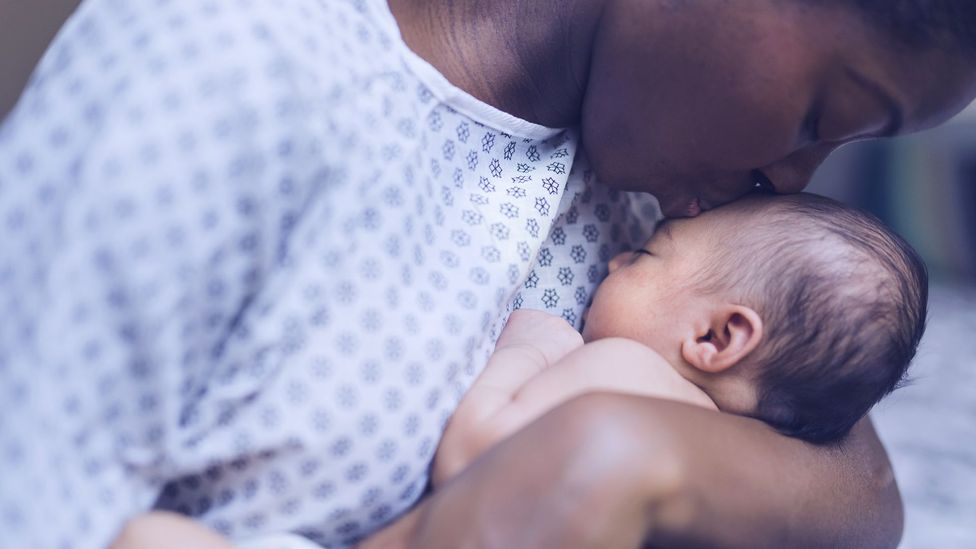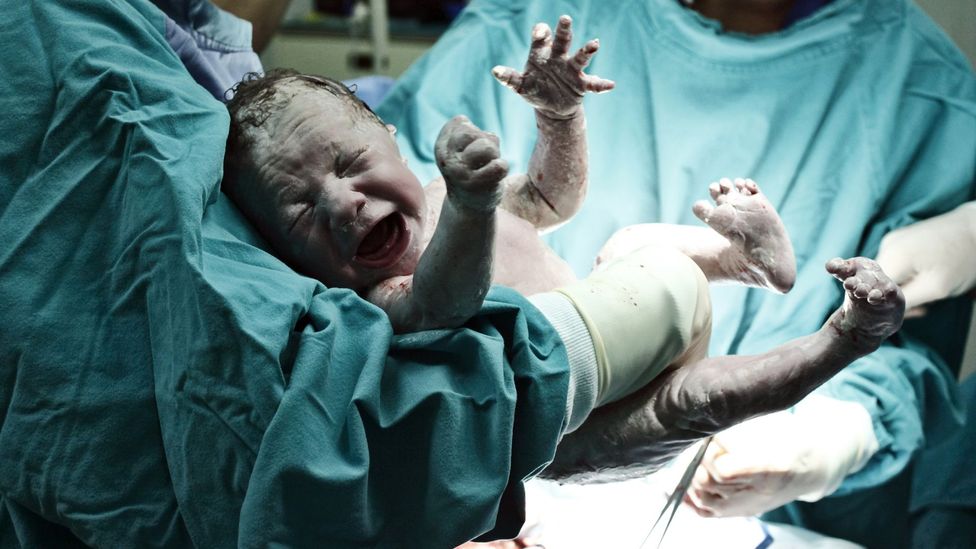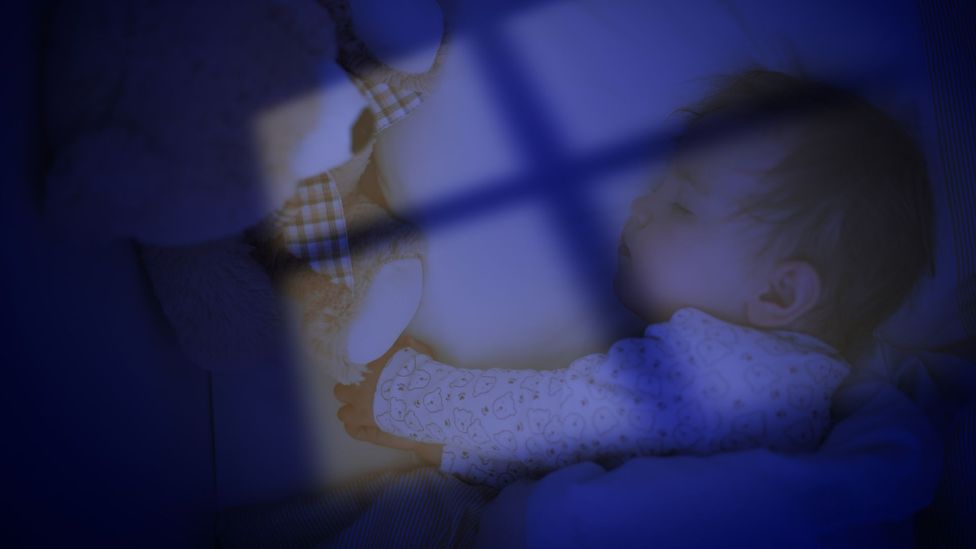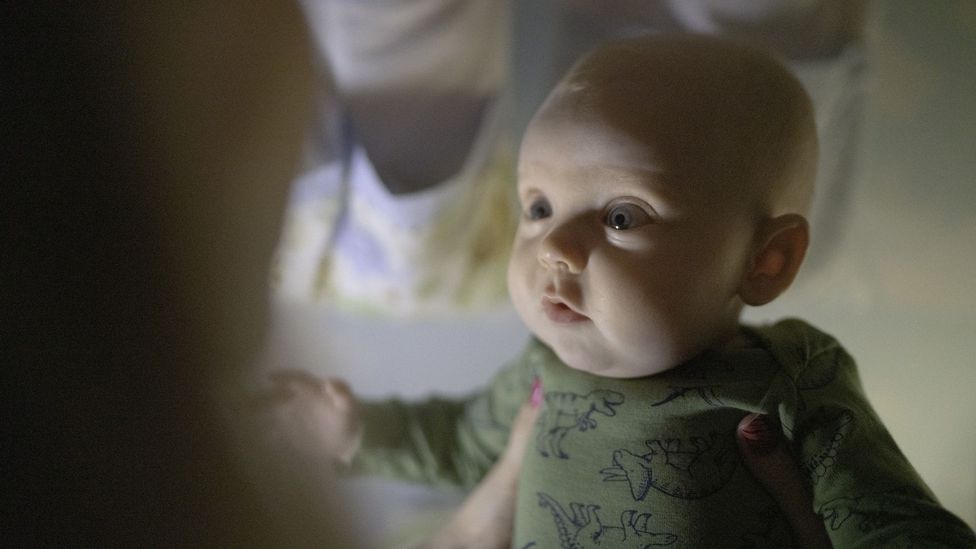What's the Hazards of a Mother With a Pierced Lip When Caring for a New Born Baby
The upshot of childbirth no-one talks near

Giving birth can exist one of the well-nigh painful experiences in a woman'due south life, yet the long-term effects that trauma can have on millions of new mothers are still largely ignored.
It'southward 03:00. My pillow is soaked with cold sweat, my body tense and shaking after waking from the same nightmare that haunts me every dark. I know I'm safe in bed – that'southward a fact. My life is no longer at take a chance, only I can't stop replaying the terrifying scene that replayed in my head equally I slept, so I remain alert, listening for any sound in the dark.
This is one of the means I experience mail service-traumatic stress disorder (PTSD).
PTSD is an anxiety disorder acquired by very stressful, frightening or sorry events, which are oftentimes relived through flashbacks and nightmares. The condition, formerly known equally "shellshock", commencement came to prominence when men returned from the trenches of World War One having witnessed unimaginable horrors. More than 100 years after the guns of that conflict fell silent, PTSD is still predominantly associated with war and as something largely experienced by men.
Y'all might also similar these other stories in the Health Gap:
• Why does dementia hitting women harder?
• How menstruation changes the brain
• The painful condition that has no cure
But millions of women worldwide develop PTSD non just from fighting on a foreign battlefield – merely also from struggling to give birth, every bit I did. And the symptoms tend to be similar for people no matter the trauma they experienced.

A traumatic commitment can be one of the causes that lead women to develop PTSD after they have given birth (Credit: Getty)
"Women with trauma may experience fearfulness, helplessness or horror nigh their experience and endure recurrent, overwhelming memories, flashbacks, thoughts and nightmares almost the birth, feel distressed, anxious or panicky when exposed to things which remind them of the upshot, and avert anything that reminds them of the trauma, which can include talking most it," says Patrick O'Brien, a maternal mental health expert at University College Infirmary and spokesman for the Royal College of Obstetricians and Gynaecologists in the Britain.
Despite these potentially debilitating effects, postnatal PTSD was only formally recognised in the 1990s when the American Psychiatry Association changed its clarification of what constitutes a traumatic issue. The association originally considered PTSD to exist "something outside the range of usual human being experience", simply then changed the definition to include an event where a person "witnessed or confronted serious physical threat or injury to themselves or others and in which the person responded with feelings of fear, helplessness or horror".
This finer unsaid that earlier this change, childbirth was deemed as well mutual to be highly traumatic – despite the life-irresolute injuries, and sometimes deaths, women can suffer as they bring children into the earth. According to the World Health Arrangement, 803 women die from complications related to pregnancy and childbirth every day.
There are few official figures for how many women suffer from postnatal PTSD, and because of the continued lack of recognition of the condition in mothers, it is hard to say how common the condition really is. Some studies that have attempted to quantify the problem estimate that 4% of births lead to the status. One report from 2003 found that effectually a tertiary of mothers who feel a "traumatic commitment", defined as involving complications, the use of instruments to help commitment or near death, continue to develop PTSD.
With 130 million babies born around the world every year, that means that a staggering number of women may be trying to cope with the disorder with niggling or no recognition.
And postnatal PTSD might not simply exist a problem for mothers. Some research has found evidence that fathers can suffer it besides subsequently witnessing their partner go through a traumatic birth.
Regardless of the exact numbers, for those who go through these experiences, at that place can be a long-lasting bear on on their lives. And the symptoms manifest themselves in many different ways.
"I regularly become vivid images of the birth in my head," says Leonnie Downes, a mother from Lancashire, Britain, who adult PTSD after fearing she was going to die when she developed sepsis in labour. "I constantly feel under threat, like I'm in a heightened awareness."
Lucy Webber, another woman who developed PTSD later on giving nascency to her son in 2016, says she developed obsessive behaviours and go extremely anxious. "I'g non able to let my baby out of my sight or let anyone touch him," she says. "I take intrusive thought of bad things happening to all my loved ones."

Nightmares that cause women to relive the fear, pain and helplessness they felt during childbirth are a common symptom of postnatal PTSD (Credit: Getty)
Not all women who take difficult births volition develop postnatal PTSD. Co-ordinate to Elizabeth Ford of Queen Mary Academy of London and Susan Ayers of the University of Sussex, it has a lot to do with a woman's perception of what they went through.
"Women who feel lack of control during nascence or who have poor care and support are more at risk of developing PTSD," the researchers write.
The stories from women who have developed PTSD after giving nascence seem to reverberate this.
Stephanie, whose name has been changed to protect her identity, says she was poorly cared for during labour and midwives displayed a lack of empathy and compassion. A particularly difficult labour saw her beingness physically held down past staff as her son was delivered. "He was born completely blue and taken abroad to be resuscitated and I was given no information on his status for hours."
Emma Svanberg, a chartered clinical psychologist who is involved in the Make Births Better Campaign, says this is a mutual theme from the women she hears from.
"The factor which nosotros hear most fourth dimension and time again is lack of kindness and pity from staff," she says.
A study past researcher Jennifer Patterson, at Napier University in Edinburgh, suggests that while midwives are often enlightened that giving nascency can be traumatic for women, they are often and then decorated they struggle to offer acceptable support and information to mothers who may be at chance of PTSD.

Giving busy nursing and midwifery staff more time to care for mothers who have been through a traumatic birth could help to prevent PTSD (Credit: Getty)
Certain groups of women are too more likely to develop postnatal PTSD even earlier they give birth.
"For women who have a history of prior trauma – perhaps victims of sexual abuse in childhood, those who take previously had PTSD, or low or anxiety – the risk of developing PTSD is significantly higher. They're five times more likely," says Rebecca Moore, a perinatal psychiatrist working for the NHS in East London.
Postnatal processing
The challenge of PTSD resides in the brain. Ordinarily, memories are filed away in the encephalon'southward hippocampus. But if an experience is traumatic, the mind goes into fight-or-flight style and the office of the encephalon associated with fear, the amygdala, switches on. This causes memories to become stuck in this archaic part of the brain rather than being safely filed abroad.
It also means that when something reminds a mother of her experience – such every bit seeing nativity depicted on Idiot box or being in a hospital – the traumatic memories feel less similar memories and more like the woman is notwithstanding in imminent danger, triggering physical reactions like panic attacks or flashbacks.
This broken filing arrangement means "you go a kind of looping of the memory in the mind all the time", Moore explains.
It may cause structural changes in the brain as well. Researchers at the Academy of California studied the brains of 89 electric current or former members of the military machine with PTSD using encephalon scans to measure out the book of various parts of the brain. It showed that the right amygdala in the brains of military-trained individuals with PTSD were 6% larger than their peers. The right-hand role of the amygdala is particularly associated with controlling fear and disfavor to unpleasant stimuli.
"Nosotros wonder if amygdala size could be used to screen who is nigh at risk to develop PTSD symptoms afterwards a mild traumatic brain injury," says Joel Pieper of Academy of California, San Diego, who was ane of those who led the report.

Millions of women may suffer from postnatal PTSD every year, simply stigma surrounding the condition may lead many to endeavour to hibernate how they are feeling (Credit: Getty)
Whether similar changes occur in the brains of women with postnatal PTSD is not notwithstanding known, but information technology could offer a way of diagnosing those who are affected. The circuitous mixture of symptoms experienced by women with PTSD after birth can often lead to delays and fifty-fifty misdiagnosis.
Another issue continuing in the way of diagnosis is the stigma attached to the condition. Some women feel uncomfortable speaking openly near it for fearfulness of existence seen as a failure as a mother, or of seeming ungrateful for their baby.
Svanberg believes nativity trauma is a feminist issue. "There is a huge torso of inquiry on the disbelief of women's pain, especially marginalised women, and oftentimes women's voices are silenced," she says. Many experts agree that women are simply not listened to or given the information they demand to make the best decisions for themselves and their family. (Read more about how women's pain is more than likely to be dismissed than men's).
"Giving women the facts well-nigh different modes of delivery while they are meaning isn't scary, it's empowering," adds Moore. "Women are capable of making up their own minds, but rarely are they properly informed about risks and treatment when it comes to birth."
She believes the problem is more of a societal ane. "Women are oft treated like princesses when they are pregnant, but once the babe is born, information technology's all about the baby," she says. "Information technology'due south not uncommon for new mothers suffering with mental illness to hear 'You've got a good for you baby, why are you complaining?' And it's then even more difficult for women to pluck upwards the courage to ask for assistance."
It's thought that half of women with perinatal mental health problems won't be treated.
"There's yet shame in seeking assistance and women struggling often fear they will exist judged and criticised," says Moore.

Postnatal PTSD can led sufferers to push abroad their partner at the time they needed them near (Credit: Getty)
Attempting to keep her condition hidden in this way started to harm Stephanie's relationships with her husband and her older daughter. Her own PTSD manifested every bit hyper-vigilance, leaving her in a permanent and exhausting state of existence alarm and expecting the worst.
"I knew I wasn't OK only kept it hidden for months," says Stephanie. "I wasn't eating or sleeping. I refused to allow anyone look afterwards my son. My other children relied on their dad equally I was too focused on my infant.
"My relationship suffered with my girl, who was but ii. I lost all my conviction in my parenting power when I was ever calm and went with the flow before. I pushed my married man and family unit abroad."
A written report led by the University of Sussex confirmed women with postnatal PTSD reported negative effects on their relationship with their partner, including sexual dysfunction, disagreements and blame for the events surrounding the nascence. The mother-baby bond was besides seriously afflicted.
Almost all women involved in the research reported initial feelings of rejection towards their baby and while this changed over time, the report ended that childbirth-related PTSD can have "severe and lasting" effects on women and their relationships.
For others, information technology is their career that suffers.
"PTSD has changed my whole life," says Leonnie Downes, who used to work for the Due north Due west Ambulance Service. "I had a proficient career, and I've had to leave my job to become self-employed just so I can piece of work from dwelling house. My wife has had to go out her chore too and has become my registered carer. I'one thousand now registered disabled and for the first time ever, we now have to live off disability benefits."

Some mothers with postnatal PTSD find themselves struggling with exhuasting levels of hyper-vigilance where they feel they cannot leave their baby unattended (Credit: Getty)
Moore says she regularly meets women who are also traumatised to return to work, including paramedics and midwives.
Lucy Webber is one such midwife. "I quit because I couldn't cope with non being able to give women the back up they demand," she explains.
Simply there is help available for women who are struggling with postnatal PTSD, provided they are able to access it. Treatment typically takes the course of medication or cognitive behavioural therapy (CBT) – a talking therapy designed to change the way someone thinks and behaves. Eye movement desensitisation and reprocessing (EMDR) can likewise exist used, which sometimes involves borer or music to help a patient's encephalon remember they are in the nowadays, not trapped in the moment of their flashback. Research also has shown that transcendental meditation can help war veterans with PTSD.
"Birth trauma is non that difficult to treat, but it is very difficult for women and partners to access appropriate support," Svanberg says, alarm that many women are misdiagnosed as having mail-natal depression (PND) – another debilitating status that can follow the birth of a child, but one with a different prepare of symptoms. In the Britain, information technology can be difficult to access treatment in some areas on the NHS, while in other countries, including the US, information technology tin can be prohibitively expensive.
But many people believe that mitigation is the answer and that better training for midwives and obstetricians could prevent women developing PTSD in the first place.

Wider acceptance of postnatal PTSD could help to ensure hereafter generations of mothers can savor their new baby equally a blessing (Credit: Getty)
"The whole system contributes to trauma," Moore says. "Often women are being cared for by frontline staff, who are doing their task simply not with much compassion, because they are burnt out." The Make Births Improve campaign focuses on offer training to medical professionals in an effort to tackle this. Modest changes that price nothing, such as using kind language and less jargon, tin brand all the difference in stopping women developing physical and mental issues as a outcome of giving nativity.
About women would agree that giving birth is a defining and transformative event. And with the right back up, good can fifty-fifty come from the well-nigh traumatic of births.
Lucy Webber says her experience has helped her become a gentler parent and Stephanie has fifty-fifty decided to become a midwife.
Almost two years on, my ain life is gradually getting easier, simply I approach my daughter's birthday with a mixture of excitement and trepidation because of the memories and concrete reactions it will undoubtedly trigger. She is the best souvenir I could always hope for and her altogether will also be a celebration of how far we have come up since her arrival.
Too the little toy guitar nosotros will be giving her, maybe the best gift I tin can offering is to play my own pocket-size function in challenging the norms of what it is to give birth and be a mother, so nascence trauma and postnatal PTSD can be dealt with in the open up.
--
This story is part of the Health Gap , a special series about how men and women experience the medical system – and their ain health – in starkly different ways. Do y'all have an experience to share? Or are you lot just interested in sharing information about women's health and wellbeing? Join our Facebook group Future Woman and be a office of the chat about the solar day-to-solar day problems that affect women'due south lives.
Join one million Future fans past liking united states on Facebook, or follow us on Twitter or Instagram.
If you lot liked this story, sign upwardly for the weekly bbc.com features newsletter, called "If You Only Read 6 Things This Week". A handpicked choice of stories from BBC Future, Culture, Capital, and Travel, delivered to your inbox every Friday.
Source: https://www.bbc.com/future/article/20190424-the-hidden-trauma-of-childbirth
Post a Comment for "What's the Hazards of a Mother With a Pierced Lip When Caring for a New Born Baby"